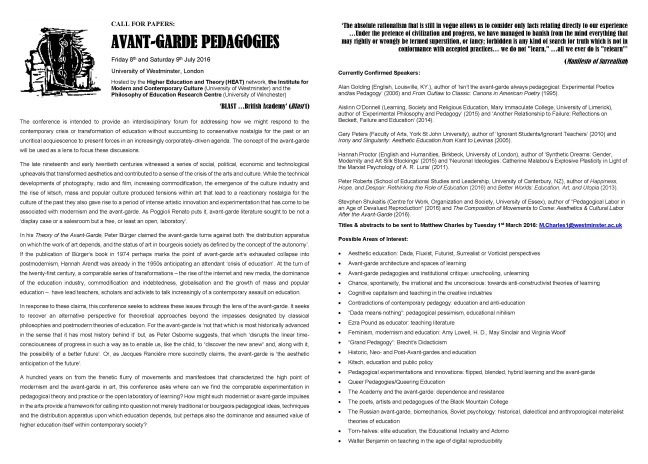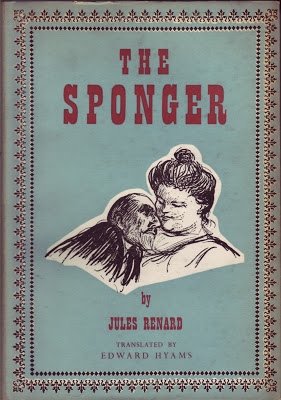
Friday 8th and Saturday 9th July 2016
University of Westminster, London
Hosted by the Higher Education and Theory (HEAT) network, the Institute for Modern and Contemporary Culture (University of Westminster) and the Philosophy of Education Research Centre (University of Winchester)
BLAST …British Academy (Blast 1)
The conference is intended to provide an interdisciplinary forum for addressing how we might respond to the contemporary crisis or transformation of education without succumbing to conservative nostalgia for the past or an uncritical acquiescence to present forces in an increasingly corporately-driven agenda. The concept of the avant-garde will be used as a lens to focus these discussions.
The late nineteenth and early twentieth centuries witnessed a series of social, political, economic and technological upheavals that transformed aesthetics and contributed to a sense of the crisis of the arts and culture. While the technical developments of photography, radio and film, increasing commodification, the emergence of the culture industry and the rise of kitsch, mass and popular culture produced tensions within art that lead to a reactionary nostalgia for the culture of the past they also gave rise to a period of intense artistic innovation and experimentation that has come to be associated with modernism and the avant-garde. As Poggioli Renato puts it, avant-garde literature sought to be not a ‘display case or a salesroom but a free, or least an open, laboratory’.
In his Theory of the Avant-Garde, Peter Bürger claimed the avant-garde turns against both ‘the distribution apparatus on which the work of art depends, and the status of art in bourgeois society as defined by the concept of the autonomy’. If the publication of Bürger’s book in 1974 perhaps marks the point of avant-garde art’s exhausted collapse into postmodernism, Hannah Arendt was already in the 1950s anticipating an attendant ‘crisis of education’. At the turn of the twenty-first century, a comparable series of transformations – the rise of the internet and new media, the dominance of the education industry, commodification and indebtedness, globalisation and the growth of mass and popular education – have lead teachers, scholars and activists to talk increasingly of a contemporary assault on education. In response to these claims, this conference seeks to address these issues through the lens of the avant-garde. It seeks to recover an alternative perspective for theoretical approaches beyond the impasses designated by classical philosophies and postmodern theories of education. For the avant-garde is ‘not that which is most historically advanced in the sense that it has most history behind it’ but, as Peter Osborne suggests, that which ‘disrupts the linear time-consciousness of progress in such a way as to enable us, like the child, to “discover the new anew” and, along with it, the possibility of a better future’. Or, as Jacques Rancière more succinctly claims, the avant-garde is ‘the aesthetic anticipation of the future’.
A hundred years on from the frenetic flurry of movements and manifestoes that characterized the high point of modernism and the avant-garde in art, this conference asks where can we find the comparable experimentation in pedagogical theory and practice or the open laboratory of learning? How might such modernist or avant-garde impulses in the arts provide a framework for calling into question not merely traditional or bourgeois pedagogical ideas, techniques and the distribution apparatus upon which education depends, but perhaps also the dominance and assumed value of higher education itself within contemporary society?
The absolute rationalism that is still in vogue allows us to consider only facts relating directly to our experience …Under the pretence of civilization and progress, we have managed to banish from the mind everything that may rightly or wrongly be termed superstition, or fancy; forbidden is any kind of search for truth which is not in conformance with accepted practices… we do not “learn,” …all we ever do is “relearn”
(Manifesto of Surrealism)
Currently Confirmed Speakers:
Alan Golding (English, Louisville, KY.), author of ‘Isn’t the avant-garde always pedagogical: Experimental Poetics and/as Pedagogy’ (2006) and From Outlaw to Classic: Canons in American Poetry (1995).
Aislinn O’Donnell (Learning, Society and Religious Education, Mary Immaculate College, University of Limerick), author of ‘Experimental Philosophy and Pedagogy’ (2015) and ‘Another Relationship to Failure: Reflections on Beckett, Failure and Education’ (2014).
Gary Peters (Faculty of Arts, York St John University), author of ‘Ignorant Students/Ignorant Teachers’ (2010) and Irony and Singularity: Aesthetic Education from Kant to Levinas (2005).
Hannah Proctor (English and Humanities, Birkbeck, University of London), author of ‘Synthetic Dreams: Gender, Modernity and Art Silk Stockings’ (2015) and ‘Neuronal Ideologies: Catherine Malabou’s Explosive Plasticity in Light of the Marxist Psychology of A. R. Luria’ (2011).
Peter Roberts (School of Educational Studies and Leadership, University of Canterbury, NZ), author of Happiness, Hope, and Despair: Rethinking the Role of Education (2016) and Better Worlds: Education, Art, and Utopia (2013).
Stevphen Shukaitis (Centre for Work, Organization and Society, University of Essex), author of ‘Pedagogical Labor in an Age of Devalued Reproduction’ (2016) and The Composition of Movements to Come: Aesthetics & Cultural Labor After the Avant-Garde (2016).
Titles & abstracts to be sent to Matthew Charles by Tuesday 1st March 2016: M.Charles1@westminster.ac.uk
Possible Areas of Interest:
Aesthetic education: Dada, Fluxist, Futurist, Surrealist or Vorticist perspectives
Avant-garde architecture and spaces of learning
Avant-garde pedagogies and institutional critique: unschooling, unlearning
Chance, spontaneity, the irrational and the unconscious: towards anti-constructivist theories of learning
Cognitive capitalism and teaching in the creative industries
Contradictions of contemporary pedagogy: education and anti-education
“Dada means nothing”: pedagogical pessimism, educational nihilism
Ezra Pound as educator: teaching literature
Feminism, modernism and education: Amy Lowell, H. D., May Sinclair and Virginia Woolf
“Grand Pedagogy”: Brecht’s Didacticism
Historic, Neo- and Post-Avant-gardes and education
Kitsch, education and public policy
Pedagogical experimentations and innovations: flipped, blended, hybrid learning and the avant-garde
Queer Pedagogies/Queering Education
The Academy and the avant-garde: dependence and resistance
The poets, artists and pedagogues of the Black Mountain College
The Russian avant-garde, biomechanics, Soviet psychology: historical, dialectical and anthropological materialist theories of education
Torn-halves: elite education, the Educational Industry and Adorno
Walter Benjamin on teaching in the age of digital reproducibility


